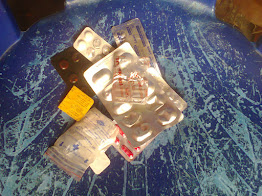Difference Between CD, POM, OTC And Complementary And Alternative Medicine
 |
| OTC, POM and CD |
Class Of Drugs
Different countries have different classes of drugs. But in Nigeria, there are three classes of drugs. They are:
Control Drugs (CD)
These drugs are drugs that must be prescribed by a registered medical doctor and must be dispensed by a licenced pharmacist. Only pharmacy outlets like community or hospital pharmacies can stock them.
Controlled drugs are drugs that are best used for conditions that are diagnosed and managed by a medical doctor. They are also drugs of potential abuse. In that case, wrong use can leave a devastating effect. E.g. Anticonvulsant.
Prescription Only Medicine (POM)
They are drugs that can be sourced from only pharmacies and dispensed under the supervision of a pharmacist. They are drugs used to treat and manage conditions that can be easily identified. The conditions can easily be treated with these drugs and may be enough for it will not persist.
The pharmacist has the duty to educate the purchaser about the condition, the drug and other health related information. The purchaser can ask questions while the pharmacist can provide the required answers. All this is to make sure that the drug is the right choice for the condition. E.g. Antimalarial tablet.
Over The Counter (OTC)
These drugs can be obtained from community pharmacies, supermarkets and patent shops. They are taken for easily recognized ailments which do not last for more than 2-3 days. The negative effects of these drugs are very low when used accordingly. E.g. paracetamol.
Supplement
Also called dietary or food supplements, these are products manufactured to supplement diet. They are taken by mouth and come in the form of capsule, tablet and liquid. They are extracted from food sources but can also be synthesized or semi synthetic. Examples are vitamins, minerals, fibres, fatty acids, amino acids, herbs, etc.
Most of their content has not been confirmed to work. That is why drug regulatory bodies mandate all manufacturers or supplements to include the phrase supporting therapy and not to heal or cure or prevent. Also, it must date that the product has not been evaluated by the national agency for food and drugs administration and control (NAFDAC). They are classed as OTC. E.g. vitamin A capsule
Alternative Medicine
Alternative medicine is also called complimentary medicine (CM), complementary and alternative medicine (CAM), integrative medicine or integrated medicine (IM) and holistic medicine. They are all the same. They are practices including drugs that aim to achieve the healing effect of medicine but lack biological plausibility and it is untested, untestable and unproven.
Read Also: Antibiotics use does not drain blood
Most are based on theories that are not inline with proven facts about how the body works. They sometimes involve supernatural and superstition into the practice.
Most of their products fall into supplements but some of their practices are not in line with international standards. E.g. allopathy

Comments
Post a Comment
Please have your say